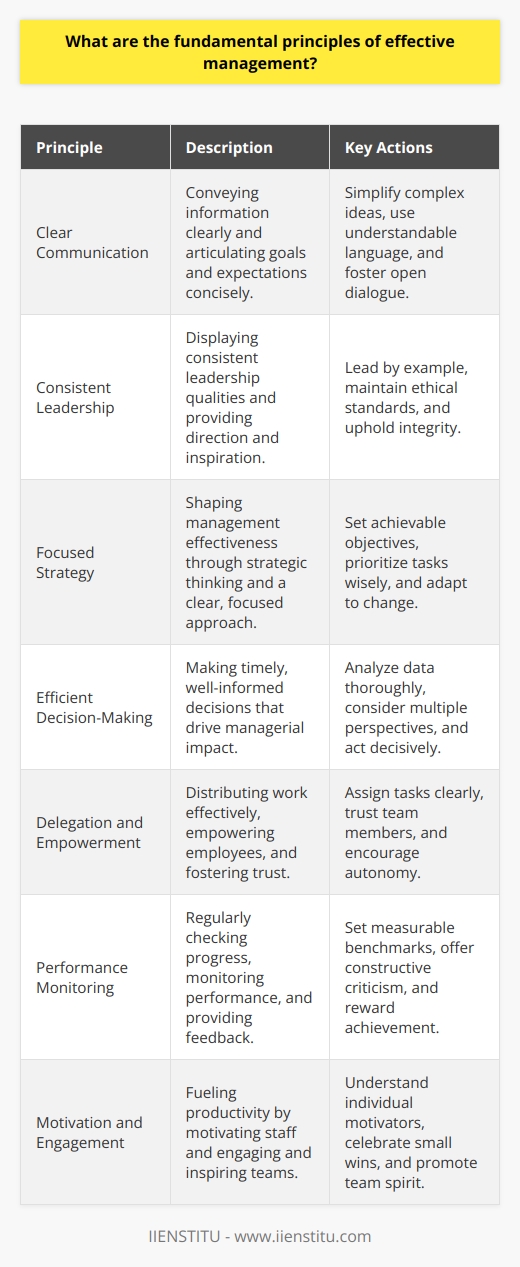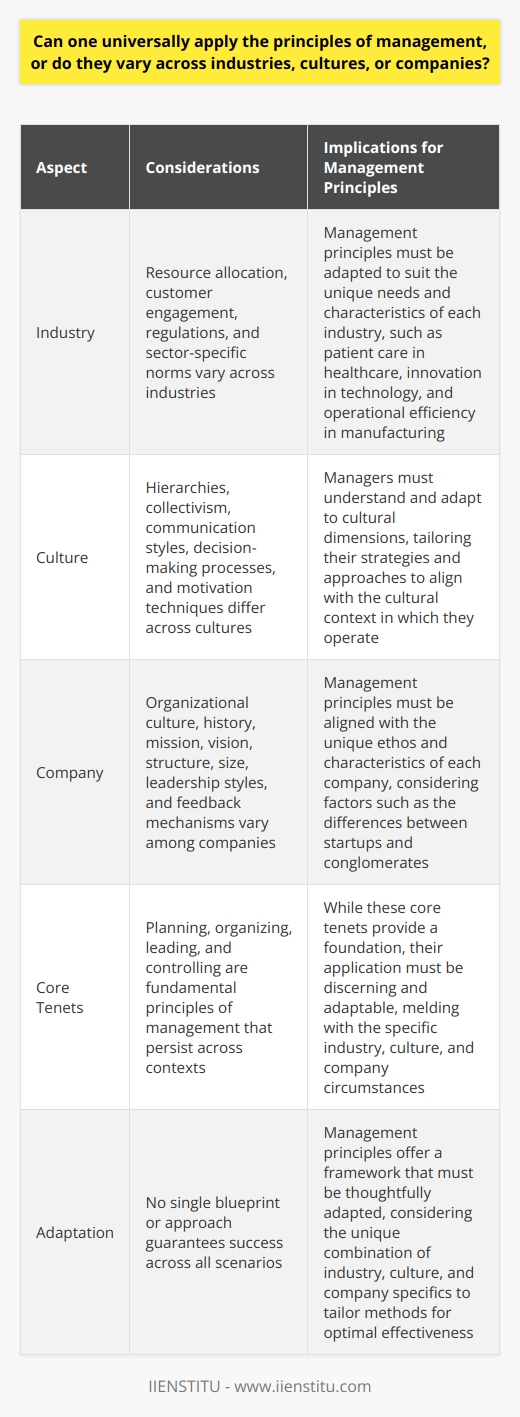
In the realm of business administration, the study and application of management principles are pivotal. These guiding concepts serve as the bedrock upon which organizational efficiency and success are constructed. This article seeks to elucidate the fundamental principles of management, offering a clear lens through which both practicing managers and students—perhaps pursuing an MBA or enrolled in a business management program—can better grasp and apply these timeless truths. The discourse aims not only to unveil these core concepts but to also provide a comprehensive understanding that is enriched with real-world examples, ensuring relevance and application in various professional settings.
Historical context of management thought: The history of management concepts is as old as human civilization, but only in recent centuries have these ideas coalesced into formal theories. Initially, management practices were passed down through apprenticeships without a structured framework. However, the industrial revolution ignited a need for systemic approaches to manage growing enterprises efficiently.
The transition from traditional to modern management theories: As businesses evolved, so too did the philosophies that governed them. From the scientific management theories of Frederick Taylor, which emphasized time and motion studies, to the human relations movement that highlighted the importance of social dynamics in the workplace, management theories have continually adapted to meet the changing demands of the workforce and marketplace.
Overview of how these principles adapt to changing business landscapes: Today, management principles reflect a complex amalgamation of past and present thought, tailored to address an ever-changing business landscape marked by technological advancements and globalization. Despite this complexity, the essence of management has remained focused on optimizing resources to achieve goals, necessitate the understanding of these principles' applicability across various temporal and situational contexts.
The Evolution of Management Principles
Historical context of management thought
Principles Of Organization For Business Efficiency And Growth
Strategies For Effective Leadership And Drive Organizational Success
Vital Managerial Functions Roles İn Effective Management And Organizational Success
Defining Management Core Concepts: The edifice of management is supported by four pillars: planning, organizing, leading, and controlling. Each function is critical; planning involves formulating strategies and setting objectives, organizing requires the assembling and coordination of resources, leading focuses on motivating and directing team members, and controlling is the measurement and correction of performance to ensure the realization of organizational aims.
Henri Fayol's Classical Principles of Management: Henri Fayol's classical theory introduced 14 principles, such as the division of work for enhanced efficiency, the balance of authority and responsibility, and the importance of discipline. His perspective also included concepts like unity of command and direction, ensuring streamlined decision-making, and the scalar chain to maintain a clear line of authority within organizations.
Modern Contributions to Management Principles: Contemporary contributions have augmented Fayol's principles with considerations for technology's role in management and the challenges posed by globalization. Management today encompasses not only the struggle for efficiency and efficacy within a local context but also the quest for competitive advantage in a global arena, necessitating a nuanced approach to these age-old principles.
The history of management concepts is as old as human civilization, but only in recent centuries have these ideas coalesced into formal theories. Initially, management practices were passed down through apprenticeships without a structured framework. However, the industrial revolution ignited a need for systemic approaches to manage growing enterprises efficiently. As noted by Wren and Bedeian in their seminal work, "The Evolution of Management Thought" (2009), the advent of the factory system in the late 18th century marked a significant shift in management practices, necessitating a more formal approach to organizing and directing labor (p. 48).
How Management Principles Apply in Various Industries: The universality of management principles is evidenced by their application across diverse sectors. In manufacturing, the principle of the division of labor increases productivity, while in the service industry, the principle of customer focus shapes organizational strategy. Each industry molds these concepts to fit its exclusive operational dynamics.
Adapting Management Principles in Diverse Organizational Cultures: Management principles do not exist in a vacuum. Their effectiveness is contingent upon the cultural matrix within which they are deployed. Leaders must tread the fine line between adhering to these principles and modifying them to suit multicultural teams, all while maintaining the integrity of the organizational vision and mission.
The transition from traditional to modern management theories
As businesses evolved, so too did the philosophies that governed them. From the scientific management theories of Frederick Taylor, which emphasized time and motion studies, to the human relations movement that highlighted the importance of social dynamics in the workplace, management theories have continually adapted to meet the changing demands of the workforce and marketplace. Mullins (2016), in his book "Management and Organisational Behaviour," discusses how the Hawthorne studies of the 1920s and 1930s revealed the significance of social factors in the workplace, leading to a more humanistic approach to management (p. 54).
Overview of how these principles adapt to changing business landscapes
Today, management principles reflect a complex amalgamation of past and present thought, tailored to address an ever-changing business landscape marked by technological advancements and globalization. Despite this complexity, the essence of management has remained focused on optimizing resources to achieve goals, necessitating the understanding of these principles' applicability across various temporal and situational contexts. As Daft (2021) emphasizes in "Management," the rapid pace of change in the modern business world requires managers to be adaptable and flexible in their application of management principles (p. 12).
Unveiling the Fundamental Principles of Management
Defining Management Core Concepts
The edifice of management is supported by four pillars: planning, organizing, leading, and controlling. Each function is critical; planning involves formulating strategies and setting objectives, organizing requires the assembling and coordination of resources, leading focuses on motivating and directing team members, and controlling is the measurement and correction of performance to ensure the realization of organizational aims. Robbins and Coulter (2021), in "Management," provide a comprehensive overview of these four functions, highlighting their interdependence and centrality to effective management (p. 8).
Henri Fayol's Classical Principles of Management
Henri Fayol's classical theory introduced 14 principles, such as the division of work for enhanced efficiency, the balance of authority and responsibility, and the importance of discipline. His perspective also included concepts like unity of command and direction, ensuring streamlined decision-making, and the scalar chain to maintain a clear line of authority within organizations. Fayol's contributions, as discussed by Witzel in "A History of Management Thought" (2011), laid the groundwork for modern management theory and continue to influence management practices today (p. 145).
Modern Contributions to Management Principles
Contemporary contributions have augmented Fayol's principles with considerations for technology's role in management and the challenges posed by globalization. Management today encompasses not only the struggle for efficiency and efficacy within a local context but also the quest for competitive advantage in a global arena, necessitating a nuanced approach to these age-old principles. As Boddy (2017) notes in "Management: An Introduction," the increasing complexity of the business environment requires managers to adopt a more strategic and holistic approach to the application of management principles (p. 22).
Management Principles Explained with Real-World Applications
How Management Principles Apply in Various Industries
The universality of management principles is evidenced by their application across diverse sectors. In manufacturing, the principle of the division of labor increases productivity, while in the service industry, the principle of customer focus shapes organizational strategy. Each industry molds these concepts to fit its exclusive operational dynamics. For instance, in the healthcare sector, the principle of unity of command is crucial in ensuring clear lines of communication and swift decision-making in emergency situations, as highlighted by Ginter, Duncan, and Swayne in "Strategic Management of Health Care Organizations" (2018, p. 201).
Adapting Management Principles in Diverse Organizational Cultures
Management principles do not exist in a vacuum. Their effectiveness is contingent upon the cultural matrix within which they are deployed. Leaders must tread the fine line between adhering to these principles and modifying them to suit multicultural teams, all while maintaining the integrity of the organizational vision and mission. Hofstede's cultural dimensions theory, as discussed in his book "Culture's Consequences" (2001), provides a framework for understanding how cultural differences can impact the application of management principles in diverse organizational settings (p. 9).
Understanding Management Principles: A Look at Leadership and Decision-Making
The Role of a Leader in Applying Management Principles
Leadership is the linchpin in the application of management principles. The style and approach of a leader can profoundly influence the interpretation and implementation of these principles. Effective leaders bridge the gap between the theoretical underpinnings of management and their practical execution, crafting a culture that embodies these concepts. As noted by Kotter in "Leading Change" (2012), successful leaders not only understand management principles but also possess the ability to inspire and guide others in their application (p. 28).
Decision-Making Processes and Management Principles
Strategic decision-making is enhanced through an integration of management principles. Leaders who contemplate the impact of their choices on planning, organizing, leading, and controlling are better positioned to steer their organizations towards success. The incorporation of these principles into daily decision-making processes ensures alignment with broader organizational goals. Hammond, Keeney, and Raiffa, in their book "Smart Choices" (2015), provide a structured approach to decision-making that emphasizes the importance of considering multiple perspectives and long-term consequences (p. 4).
Navigating Common Misconceptions About Management Principles
Debunking Management Myths
Misconceptions can arise when management principles are seen as rigid dicta rather than flexible guides. This section dismantles such myths, advocating for a dynamic interpretation that permits adaptability and real-world applicability. The focus is on the spirit rather than the letter of these principles. As Mintzberg argues in "The Rise and Fall of Strategic Planning" (1994), the mechanistic application of management principles can stifle creativity and adaptability, leading to suboptimal outcomes (p. 221).
Emphasizing the Need for Contextual Application
The pragmatism of management principles lies in their situational application. Context influences their effectiveness, and a deep understanding of this context allows managers to leverage these principles successfully. It is a call for managers to develop an acute situational awareness, adapt their approach accordingly, and refrain from monolithic applications of management theories. Drucker, in his influential work "Management: Tasks, Responsibilities, Practices" (1974), stresses the importance of understanding the specific context in which management principles are applied, noting that "the first task of management is to define what the specific situation requires" (p. 17).
Conclusion
The journey through the core concepts of management principles culminates in an appreciation of their enduring relevance. This exploration encourages current and future managers to engage with these principles not as immutable laws but as canvases on which to paint their leadership philosophies. As the business world evolves, so must the interpretation and application of these principles, requiring a commitment to continuous learning and flexibility. By embracing the fundamental principles of management, recognizing the importance of management principles in business administration, and understanding the evolution of management theories and their relevance today, managers can apply these principles effectively in real-world scenarios. Through effective leadership and decision-making, managers can adapt these principles to multicultural organizations, debunk common misconceptions about management theories, integrate technology into management strategies, and employ best practices for planning, organizing, leading, and controlling in organizations. In doing so, they can navigate the complexities of the modern business landscape and steer their organizations towards success.
References
Boddy, D. (2017). Management: An introduction (7th ed.). Pearson.
Daft, R. L. (2021). Management (14th ed.). Cengage Learning.
Drucker, P. F. (1974). Management: Tasks, responsibilities, practices. Harper & Row.
Ginter, P. M., Duncan, W. J., & Swayne, L. E. (2018). Strategic management of health care organizations (8th ed.). Wiley.
Hammond, J. S., Keeney, R. L., & Raiffa, H. (2015). Smart choices: A practical guide to making better decisions. Harvard Business Review Press.
Hofstede, G. (2001). Culture's consequences: Comparing values, behaviors, institutions, and organizations across nations (2nd ed.). Sage Publications.
Kotter, J. P. (2012). Leading change. Harvard Business Review Press.
Mintzberg, H. (1994). The rise and fall of strategic planning. Free Press.
Mullins, L. J. (2016). Management and organisational behaviour (11th ed.). Pearson.
Robbins, S. P., & Coulter, M. A. (2021). Management (15th ed.). Pearson.
Witzel, M. (2011). A history of management thought. Routledge.
Wren, D. A., & Bedeian, A. G. (2009). The evolution of management thought (6th ed.). Wiley.
Frequently Asked Questions
What are the fundamental principles of effective management?
Understanding Effective Management
Effective management requires comprehension of core principles. These principles serve as guidelines. They enable managers to direct teams successfully. Knowledge of these principles is essential. It equips managers for various scenarios.
Principle 1: Clear Communication
Communication stands as a pivotal principle. Managers must convey information clearly. They should articulate goals and expectations concisely.
- Simplify complex ideas.
- Use understandable language.
- Foster open dialogue.
Principle 2: Consistent Leadership
Leadership provides direction and inspiration. Managers must display consistent leadership qualities.
- Lead by example.
- Maintain ethical standards.
- Uphold integrity.
Principle 3: Focused Strategy
Strategic thinking shapes management effectiveness. Managers need a clear, focused strategy.
- Set achievable objectives.
- Prioritize tasks wisely.
- Adapt to change.
Principle 4: Efficient Decision-Making
Decisions drive managerial impact. Timely, well-informed decisions are crucial.
- Analyze data thoroughly.
- Consider multiple perspectives.
- Act decisively.
Principle 5: Delegation and Empowerment
Delegation distributes work effectively. It empowers employees and fosters trust.
- Assign tasks clearly.
- Trust team members.
- Encourage autonomy.
Principle 6: Performance Monitoring
Regular performance checks ensure progress. Managers must monitor and provide feedback.
- Set measurable benchmarks.
- Offer constructive criticism.
- Reward achievement.
Principle 7: Motivation and Engagement
Motivating staff fuels productivity. Managers must engage and inspire their teams.
- Understand individual motivators.
- Celebrate small wins.
- Promote team spirit.
Principle 8: Adaptability and Learning
Change is constant in business. Managers must remain adaptable and embrace learning.
- Seek continuous improvement.
- Encourage innovation.
- Learn from mistakes.
Principle 9: Resource Management
Effective resource management optimizes outputs. Managers should utilize resources judiciously.
- Allocate resources smartly.
- Reduce waste.
- Maximize value.
Principle 10: Stakeholder Consideration
Stakeholders shape business landscapes. Managers must consider their interests and needs.
- Engage with stakeholders.
- Balance diverse interests.
- Foster partnerships.
These principles guide effective management. Managers who apply them drive their teams to success. Understanding these principles is key. It enables managers to navigate complex business environments. Excellence in management stems from these fundamental constructs.

How do different principles of management apply in various organizational structures?
Principles of Management in Organizational Structures
Management principles guide how organizations achieve their goals. They apply differently in varying structures. These principles include planning, organizing, leading, and controlling. We will explore their application across organizational forms.
Hierarchical Structure
Hierarchical structures have clear authority. Here, the principle of planning involves detailed strategies. Top management sets goals. Lower levels focus on execution.
Organizing involves a rigid division of labor. Employees have specific roles. The system prioritizes efficiency.
Leading sees managers directing subordinates. They communicate top-down orders. Leaders motivate within clear lines of authority.
Controlling entails strict supervision. Managers ensure compliance with standards. Feedback travels up the hierarchy.
Flat Structure
Flat organizations have fewer levels. The principle of planning becomes more collaborative. Teams often set their own goals.
Organizing allows flexibility. Jobs may overlap. Employees multitask and collaborate.
Leading shifts towards empowerment. Managers act as mentors. Leadership supports autonomy.
Controlling is less formal. Self-management increases. Teams assess their own performance.
Matrix Structure
Matrix organizations blend features. They operate through cross-functional teams.
Planning is project-focused. It demands coordination across departments. Managers balance competing interests.
Organizing is dynamic. It combines departmental and project-based responsibilities. Dual reporting lines emerge.
Leading needs strong communication. Leaders handle complex team dynamics. They encourage cooperation.
Controlling involves monitoring multiple activities. Managers track both team and functional performance. They adjust resources as needed.
Network Structure
Network structures revolve around outsourcing. Their principle of planning is outcome-based. They set goals for each partnership.
Organizing is modular. Companies rely on external partners. Collaboration extends beyond organizational boundaries.
Leading focuses on relationship management. Leaders coordinate across the network. They nurture partnerships.
Controlling happens through contracts. Performance metrics guide partnerships. Organizations review results regularly.
Holacratic Structure
Holacracy distributes authority. It emphasizes roles over job titles. Planning here is iterative. Teams adjust objectives frequently.
Organizing is fluid. Employees take on different roles. Tasks change as needed.
Leading is decentralized. All team members can lead. Decision-making is collective.
Controlling involves peer accountability. Teams set their own goals. They review each other’s contributions.
Management principles adapt to each structure. Yet their essence remains. They guide how work gets done. They shape the organizational culture. Understanding these applications helps managers lead effectively. It also aids in designing structures that align with business strategies.

Can one universally apply the principles of management, or do they vary across industries, cultures, or companies?
The Universality of Management Principles
Management principles often tout a degree of universality. Academics and practitioners drive the debate. They scrutinize the adaptability of these principles.
Industry-Specific Considerations
Industries differ. Their needs diverge. Resource allocation varies. Customer engagement differs. Regulations also play a role. These factors influence management.
Healthcare entails specific norms. Patient care stands paramount. Technology sectors move rapidly. Innovation becomes a key focus. Manufacturing demands operational efficiency. Techniques like Lean management work well here.
Cultural Nuances
Culture shapes management. It defines interactions. Hierarchies and collectivism manifest differently. Understanding cultural dimensions is critical. Hofstede's model is often referenced. It assesses cultural differences effectively.
Managers must adapt strategies. Communication styles require tailoring. Decision-making processes change with culture. Motivation techniques do, too.
Company-Specific Variances
Organizational culture is unique. Company history matters. Mission and vision guide strategy. Structure and size affect management. Startups function differently than conglomerates. They necessitate distinct approaches.
Leadership styles must align. They must suit the company ethos. Feedback mechanisms may vary. Hierarchical structures might differ.
Finding Common Ground Across Diverse Contexts
Principles of management lay a foundation. They offer strategies and tools. Planning, organizing, leading, and controlling persist. These are core tenets.
Yet, application demands discernment. Principles must meld with context. No blueprint fits all scenarios.
Management principles offer a framework. Adapt them thoughtfully. No single approach guarantees success. Consider industry, culture, and company specifics. Tailor methods to fit unique circumstances.



